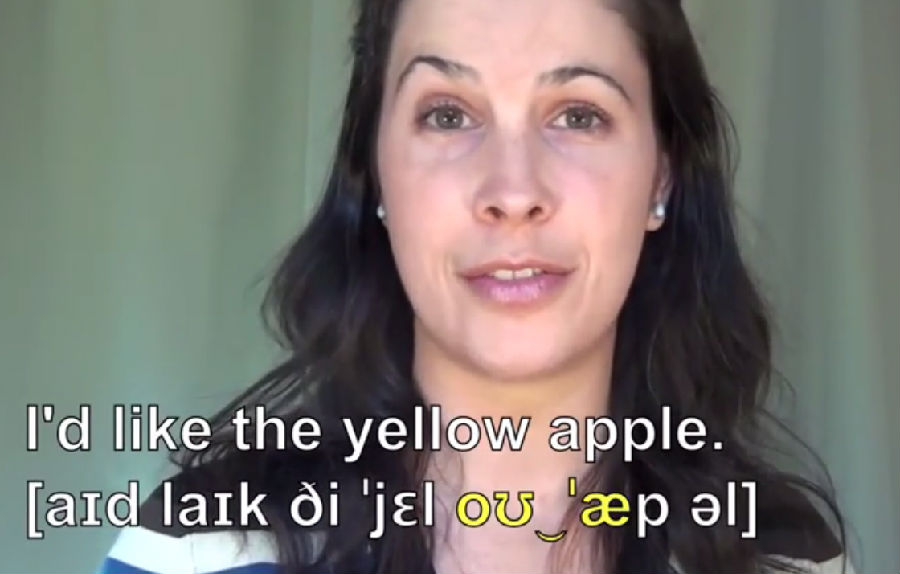(单词翻译:单击)
Today I'm going to do another video on linking.
今天,我要再做一个关于连读的视频。
And today specifically, we'll talk about linking two words when one ends in a vowel sound and the next one begins in a vowel sound -- vowel or diphthong sound.
具体来说,今天我们要讨论的是当一个单词以元音结尾,下一个单词以元音或复合元音开头时这两个单词的连读。
In this case, there should be constant sound when you are linking; there should be no break between the words.
在这种情况下,你连读时要连续不间断地读,单词之间不能有停顿。
Let's take for example the sentence, "Did you exercise?""Ooo--eh, oo-eh. You--eh, you exercise. "
我们以这个句子为例子,"Did you exercise?""Ooo--eh, oo-eh. You--eh, you exercise. "
Some of my students put a tiny break between each word.
我的一些学生会在每个单词之间小小地停顿一下。
And if you say "oo eh" with a tiny break, no matter now small that break is, it's still not linked. "Ooeh, ooeh", constant sound.
如果你在说“oo eh”的时候有小停顿,不管这个停顿的时间有多短,它都不是连读。"Ooeh, ooeh",要连续不间断地读。

Now, I'll note that there are two consonant sounds, the W and the Y, that are glide consonants.
在这里,我要指出两个辅音,W和Y音,它们是滑移辅音。
And you may find that you feel like you're making one of these sometimes when you link. That's ok. "You-eh."
你可能会发现自己在连读时好像在发这两个音。没关系。"You-eh."
The "oo" as in "boo" is very related to the W consonant sound. So if you feel like you're making that W consonant sound, don't worry about it.
单词“boo”里的“oo”音和辅音W十分相近,所以,如果你觉得自己在发辅音W的话,不用担心。
Think about the constant sound, "uh", of your vocal cords underneath the vowel sounds that you're making. "Oo-eh, oo-eh."
想想你在发元音时,在元音下面,你的声带所发出的辅音“uh”。"Oo-eh, oo-eh."
For some of you this will be no problem, because your native language also links.
对于你们中的一些人来说,这不是问题,因为在你们的母语中也会有连读。
For some of you however, though it's a simple concept, it will take a while to get comfortable with that, to break the habit of putting tiny breaks between words.
然而对于另外一些人来说,这虽然是一个简单的概念,但还是需要一段时间来习惯,来改掉在单词之间停顿的习惯。
So, let's look at some further examples.
那么我们再来看一些例子。
In this sentence, the word "yellow" ends with the "oh" as in "no" diphthong, and the word "apple" with the AA vowel.
在这个句子里,单词“yellow”以“no”里面的复合元音“oh”结尾,单词“apple”以AA元音开头。
"Oh, aa. Oh-aa, oh-aa", no break in sound. "Oh-aa." And now quicker: "oh-aa, oh-aa. I'd like the yellow apple."
"Oh, aa. Oh-aa, oh-aa",中间没有停顿。"Oh-aa."现在加快速度:"oh-aa, oh-aa. I'd like the yellow apple."
The "ai" as in "buy" diphthong linking with the AA. "Aiaa, aiaa, aiaa, aiaa, aiaa. I actually did."
单词“buy”里面的复合元音“ai”和AA元音连读。"Aiaa, aiaa, aiaa, aiaa, aiaa. I actually did."
This next sentence is the title of a standard that I happened to have in my head while I was brainstorming this blog.
下面这个句子是我在构思这个博客时碰巧想到的一个标准的标题。
We have the "ee" as in "she" vowel linking to the "ih" as in "sit" vowel. "Ee-ih, ee-ih, ee-ih, ee-ih, ee-ih, ee-ih. Don't fence me in."
在这里,单词“she”里面的“ee”元音和“sit”里的“ih”元音连读。"Ee-ih, ee-ih, ee-ih, ee-ih, ee-ih, ee-ih. Don't fence me in."
Here we have the "ee" as in "she" linking to the schwa sound. "Ee-uh, ee-uh, ee-uh, ee-uh. She wants to be alone."
在这里,单词“she”里面的“ee”元音和弱读元音连读。"Ee-uh, ee-uh, ee-uh, ee-uh. She wants to be alone."
And here the "ow" as in "now" diphthong linking to the schwa. "Ow-uh, ow-uh, ow-uh, ow-uh. How about tomorrow?"
在这里,单词“now”里面的复合元音“ow”与弱读元音连读。"Ow-uh, ow-uh, ow-uh, ow-uh. How about tomorrow?"
The EE vowel linking to the AA vowel. "Ee, aa, ee-aa, ee-aa, ee-aa, ee-aa. I like Woody Allen movies."
EE元音与AA元音连读。"Ee, aa, ee-aa, ee-aa, ee-aa, ee-aa. I like Woody Allen movies."
The "ee" as in "she" vowel linking to the "ah" as in "father" vowel. "Ee, ah, ee-ah, ee-ah, ee-ah, ee-ah. I'd be honored."
单词“she”里面的“ee”元音与单词“father”里面的“ah”元音连读。"Ee, ah, ee-ah, ee-ah, ee-ah, ee-ah. I'd be honored."
This last sentence has two examples.
最后这个句子里面有两个例子。
The "ai" as in "buy" diphthong linking to the "aw" as in "law" vowel. "Ai-aw, ai-aw, ai-aw. I almost."
单词“buy”里面的复合元音“ai”与单词“law”里面的“aw”元音连读。"Ai-aw, ai-aw, ai-aw. I almost."
The "ee" as in "she" vowel linking to the "ai" as in "buy" diphthong. "Ee, ai, ee-ai, ee-ai. The ice. I almost fell on the ice."
单词“she”里面的“ee”元音与单词“buy”里面的“ai”复合元音连读。"Ee, ai, ee-ai, ee-ai. The ice. I almost fell on the ice."
That's it and thanks so much for using Rachel's English.
这次的学习就到这里,非常感谢使用Rachel's English。


